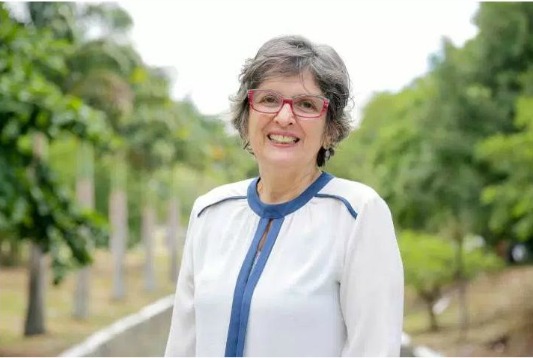Fiocruz researcher is one of Time's Persons of the Year

25/05/2017
Social Communication Coordination (CCS) and Fiocruz PE
The Fiocruz Pernambuco researcher Celina Turchi was selected as one of the one hundred most influent persons in the world by Time magazine for her work organizing a task force to fight the zika virus. The traditional list of one hundred personalities is selected annually and includes names from all society areas, from public authorities to the arts, including young entrepreneurs and religious leaders. The homage is celebrated with a gala dinner, reuniting persons that are highlights in politics, technology, science, philanthropy, media, business, and entertainment. The event was held April 25 at the Jazz at Lincoln Center, in New York.
Included in the "pioneers" section of the list, the text says that Turchi is "passionate, driven and a model of the kind of global leadership and collaboration needed to protect human health”. According to the magazine, the researcher "understood that this was a global crisis requiring global collaboration, so she reached out to experts from around the world, facilitated their work and collaboration in Brazil and openly shared what she and her colleagues were finding so that the world could learn about this unprecedented threat".
Time also states that Turchi's studies have been part of an "emergency investigation that ultimately proved that Zika does indeed cause microcephaly—something many skeptics doubted". The text also says that, although there is still a lot that we do not know about the disease (as, for example, why some fetuses develop microcephaly and others do not; or how to prevent the neurological damage caused by the virus), the work of Celina “and partnership with other scientists is bringing the world closer to answering those and other crucial questions.”
Native from Goiás, Celina is 64 years old, and a physician and PhD in epidemiology of infectious diseases. She coordinates the Microcephaly Epidemics Research Group (Merg), which develops the first case-control study relating the zika virus to such disease. Merg is formed by about 30 researchers from Fiocruz PE, the University of Pernambuco, the Federal University of Pernambuco, the Health Secretariat of Pernambuco, the London School of Hygiene and Tropical Medicine, Fundação Altino Ventura (Altino Ventura Foundation), Associação de Assistência à Criança Deficiente (Association of Assistance to the Impaired Child) (AACD), and Instituto de Medicina Integral Professor Fernando Figueira (Professor Fernando Figueira Integral Medicine Institute) (Imip).
It was a grateful surprise for the researcher to receive the nomination from Time. “I share this homage with the team of health professional researchers in Merg, who acted in the front line of the investigation on the microcephaly epidemics, which has its spectrum widened and is now called congenital zika syndrome”, she stated.
The chairperson of Fiocruz, Nísia Trindade Lima, stated that the nomination recognizes Fiocruz's efforts to fight the public health emergency. "This more recent homage to Celina is a reason for pride not only for Fiocruz, but also for Brazilian science. The work of Celina and others of our researchers led to pivotal findings to fight zika. This nomination recognizes Fiocruz's commitment to the Brazilian public health and shows that studies developed here are similar to the ones in any other place in the world."
Recognized last year by the scientific magazine Nature as one of the ten personalities most influent in science (the only Brazilian to be part of such list), Celina received the Faz Diferença award of the Rio de Janeiro newspaper O Globo in March, in the Personality of the Year category, together with the physician Adriana Melo, from Paraíba. Celina also received the Heroínas do Tejucupapo Medal of Honor in March, granted by theOrder of Attorneys of Brazil (OAB) – Pernambuco Section, among other awards.
The director of Instituto Aggeu Magalhães (Aggeu Magalhães Institute) (IAM/Fiocruz Pernambuco), Sinval Brandão Filho, is satisfied with one more recognition of the work led by Celina, supported by the director board of Instituto Aggeu Magalhães, by articulating the research groups of the institute with colleagues from other institutions, such as Federal University of Pernambuco (UFPE) and Pernambuco State University (UPE), Imip, and the hospitals that took part in the cohorts. “When the zika epidemics arose, we were summoned by the Ministry of Health and the State Secretariat of Health to really pull together to answer to the understanding about such new public health problem”, he explained. “And the recognition provided by Nature in the end of the last year and now by Time magazine reaffirms the whole effort and the success in the work performed to prove the association between zika virus and microcephaly cases.”




